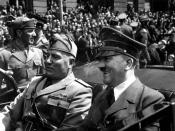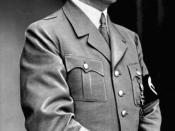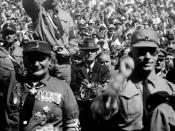"How fortunate for leaders that men do not think" - Adolf Hitler. These words, not necessarily of wisdom, come from the mouth of one of the most talked-about figures in history. Hitler proved to be one of the most influential leaders in modern times, amassing a gathering of thousands of Nazis who carried out his orders without question, resulting in the torture and persecution of millions. Historians often question how Hitler gained so much power without successful opposition, and the answer lies in his gradual path to authority. Hitler first entered the public eye as the chairman of the German Workers' Party, renamed the Nationalist Socialist German Workers, colloquially known as the Nazis. From 1923, the number of members of the Nazis rose from 6,000 to 55,000. Certain conditions in Weimar Germany at the time accounted for this dramatic rise in membership, namely the political instability of the country, the economic collapse, the anti-Semitic views of the people, and the Munich Putsch, all significant catalysts for the staggering increase in Nazi membership.
The political instability at the time was a tremendous advantage for Hitler's party, being one of the main reasons for the swell in his ranks. Mainly, there were huge flaws in the coalition government, in part because of the discord in the left wing. After the formation of the Weimar Republic, five or six major parties had survived from the imperial period and a coalition government was decided upon. However, the parties refused to cooperate with one another, and this was exacerbated by the presence of both extremist left and right wing parties. The SPD, the largest party on the left, faced conflict with the Communist party. If the SPD were to coalesce with the central parties, many of their working-class voters would defect to the Communist Party,


